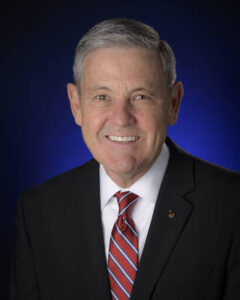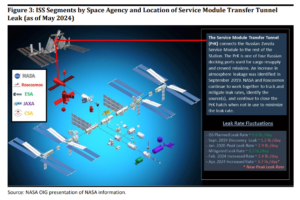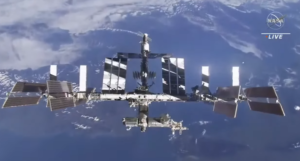U.S., Russia Disagree on Causes, Risks of Leaks on ISS
A U.S.-Russian Joint Commission that reviews safety on the International Space Station was not able to reach agreement on what is causing air leaks on the Russian segment of the ISS or the potential risks. Meeting in September in Moscow, Russian and NASA members of the Joint Commission saw the situation quite differently. NASA considers the risks to be much higher than Russia and is implementing preventive measures when the hatch to the area where the leaks are occuring is open.
NASA’s International Space Station Advisory Committee includes the U.S. members of the Joint Commission. It was chaired for many years by renowned Gemini and Apollo astronaut Tom Stafford who commanded the 1975 Apollo-Soyuz Test Project and developed close ties with his Russian counterparts. Stafford passed away earlier this year and NASA Administrator Bill Nelson appointed Bob Cabana as his successor.

Cabana, another renowned former astronaut, also has close ties with the Russian human spaceflight community. He commanded the first ISS assembly mission that included Russian cosmonaut Sergei Krikalev and later was Director of Kennedy Space Center and NASA Associate Administrator. He retired from NASA at the end of last year and is now at IBX.
Cabana’s committee held its first public session since March 2020 today to report on the results of the September 17-18 Moscow meeting and the recommendations they made to Nelson and Roscosmos Director General Yuri Borisov. It was the first time the Joint Commission met in person since COVID. They met virtually in-between. The Joint Commission is in addition to routine meetings between NASA ISS program officials and their Russian counterparts.
The major focus was the air leaks.
The leaks are in a tunnel, PrK, that connects Russia’s Zvezda module to a docking port used for Progress cargo ships. Also called the Service Module, Zvezda is at one of the ends of the ISS.

The first leak was detected in September 2019 according to a 2024 report from the NASA Office of Inspector General (OIG). More have occurred since. Russia has tried a variety of measures to repair the leaks with some success, but in February 2024, Joel Montalbano revealed that the leak rate had increased. At the time he was NASA’s ISS Program Manager. He is now Deputy Associate Administrator for the Space Operations Mission Directorate.
The NASA OIG report was generally positive about NASA’s planning for continued operations of the ISS through 2030, but noted that after meetings with Russian counterparts in May and June, the ISS program elevated the air leak issue to “the highest level of risk in its risk management system.”
Cabana detailed how differently NASA and Roscosmos view the dangers .
“The Joint Commission noted that although the teams continue to investigate the causal factors for the crack initation and growth, U.S. and Russian technical teams don’t have a common understanding of what the likely root cause is or the severity of the consequences of these leaks.
“The Russian position is that the most probable cause of the PrK cracks is high cyclic fatigue caused by micro vibrations. NASA believes the PrK cracks are likely multi-causal including pressure and mechanical stress, residual stress, material properties and environmental exposures.
“The Russians believe that continued operations are safe, but they can’t prove that to our satisfaction. The U.S. believes that it’s not safe, but we can’t prove that to Russian satisfaction that that’s the case.
“So while the Russian team continues to search for and seal the leaks, it does not believe catastrophic disintegration of the PrK is realistic and NASA has expressed concerns about structural integrity of the PrK and the possibility of a catastrophic failure.”
Cabana said the Joint Commission recommended to Nelson and Borisov that a team of outside experts from academia and/or industry be brought in to determine the root cause. “This is an engineering problem and good engineers should be able to reach a solution and agree on it.”
NASA has already complied with that recommendation, he said, and looks forward to Russia doing the same. Until the matter is settled “operational mitigations must be taken” when the hatch between the PrK and Zvezda is open.
Cabana didn’t specify what those mitigations are, but during a post-mission briefing last week, Crew-8 astronaut Mike Barratt said they now close the hatch between the U.S. segment and the Russian segment when the cosmonauts need to open the PrK hatch to access a Progress vehicle docked there: “It’s not a comfortable thing, but it’s the best agreement between all the smart people on both sides and it’s something that we as a crew live with and enact. … It’s something that we accept and we perform as we are directed by both sides.”

The ISS is a partnership among the United States, Russia, Japan, Canada and 11 European countries working through the European Space Agency. It’s old. The first modules have been in orbit since 1998 and the space station has been permanently occupied by international crews rotating on roughly six-month schedules for just over 24 years — since November 2, 2000.
Note: NASA’s advisory committee website currently has no information about the ISS Advisory Committee (ISSAC) other than its charter and the one on that site actually is out of date. The current charter is here. It does not have the public minutes of previous ISSAC meetings even though they are required under the Federal Advisory Committee Act (FACA). NASA tells SpacePolicyOnline.com the “committee is in the process of updating its web presence to ensure ease of access to publicly-available materials.” In the meantime, they provided us with the minutes of the last public meeting on March 30, 2020, and said the minutes of this meeting will be publicly available soon and provided a link to today’s recording. The members of the committee are:
*Col. Robert Cabana, USMC (Ret.), Chairman
William Vantine, Ph.D., Deputy Chairman
*Capt. Frank Culbertson, USN (Ret,)
Charles Daniel, Ph.D.
Michael Greenfield, Ph.D.
Daniel Heimerdinger, Ph.D.
Ms. Ginger Kerrick
Ms. Harmony Myers
Brig. Gen. (Dr.) Josef F. Schmid, USAF Reserves
*Capt. William Shepherd, USN (Ret.)
*Ms. Nicole Stott
*Shannon Walker, Ph.D.
Members with an asterisk are former NASA astronauts
User Comments
SpacePolicyOnline.com has the right (but not the obligation) to monitor the comments and to remove any materials it deems inappropriate. We do not post comments that include links to other websites since we have no control over that content nor can we verify the security of such links.